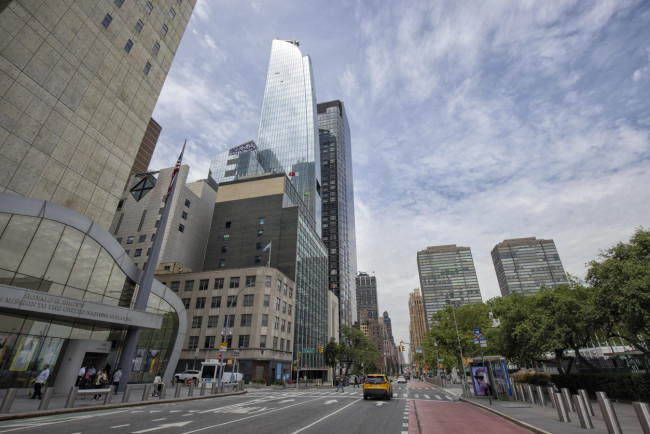How much do NYC sellers pay for closing costs?
- Closing costs for sellers average 8 to 10 percent of the final price
- In slower markets a seller may pay the flip tax in order to close the deal

For a $1 million property, sellers can fork over $80,000 to $100,000 in closing costs.
iStock
Unless you've sold an apartment or townhouse in New York City in the recent past, you may be shocked by how big a bite closing costs can take out of your profit.
Most experts advise allocating a whopping 8 to 10 percent of the purchase price to cover these fees and taxes—double what buyers can expect to pay on their end. That means you'd have to fork over $80,000 to $100,000 in closing costs on a $1 million sale—and this amount is on top of paying off any outstanding mortgage balance. Ouch.
Plus to get deals done in a soft market, sellers face covering some of the buyer's closing costs at the negotiating table. Double ouch.
Besides avoiding surprises at the closing table, knowing what your net profit will be (minus closing costs) will help you set a realistic budget before you begin your next home search—and before you fall for something that might be out of your price range.
As with all real estate transactions, the actual costs will vary depending on the type and location of the property and you'll want to explore your options with an experienced broker and attorney to get the most out of your sale.
To find out what buyers are willing to pay for your co-op, condo, or brownstone, consider discreetly "pre-marketing" it. New York City real estate brokerage The Agency has an entire data-driven pre-marketing platform that provides a way to quietly test your asking price and your marketing strategy among real-life qualified buyers before publicly listing your home. There's no charge to participate and no obligation to enter a traditional listing agreement at the end of the pre-marketing period if your place hasn't sold. Click here for more information.
Broker fees
Commissions represent the biggest slice of the closing-cost pie. In NYC, sellers are expected to cover the broker fee, which is typically 5 to 6 percent of the purchase price and split equally between the seller's and buyer's agents—or all to the seller's agent if the buyer is unrepresented (aka a direct buyer). That's $60,000 on a $1 million deal.
There's no law that dictates what brokers charge, however; that 5 to 6 percent is based on an industry standard and is ostensibly negotiable.
[November 2023 update: REBNY’s new policy on broker fees prohibits a seller’s broker from paying the buyer’s broker directly. The rule takes effect in January 2024 and makes broker fees more negotiable and means some buyers may be on the hook for paying their broker. For more, read: Sellers (and buyers!) brace for a broker fee shakeup.]
"My recommendation for a seller who wants to negotiate a broker commission is to speak with/interview a few different brokers at different companies and ask each what the best they can do on their commission is," says attorney Adam Stone, partner and founder of The Stone Law Firm. "But I’m generally not a proponent of negotiating down a broker commission because if I was a seller I’d want the broker to be incentivized as much as possible to focus attention and assets on my deal to achieve the best result."
Daniel Gershburg, an attorney with Konner Gershburg Melnick Darouvar, agrees. “While there has been some market pressure to lower commission percentages, what I’ve found is that the top tier brokers continue to charge 5 or 6 percent and they bring tremendous value to their clients. They’re the gatekeepers and the reason as to whether your sale has a good chance to go through quickly, so I would be very hesitant to negotiate that down to save costs."
Transfer taxes
This being NYC, sellers of co-ops, condos, and townhouses pay a combined state and city transfer tax of 1.825 percent if the sale price is over $500,000 or 1.4 percent for deals $500,000 or less. That works out to $18,250 on a $1 million sale, and $7,000 on a $500,000 sale. The New York State transfer tax increases to by 0.25 percent for transactions greater than $3 million (meaning you'd pay $83,300 on a $4 million deal).
Note that buyers are responsible for paying transfer taxes when buying a co-op or brand-new condo from the sponsor, though this often becomes part of the negotiation process.
Flip taxes
Some co-op and condo buildings have flip taxes (also known as transfer fees) ranging anywhere from 1 to 2 percent of the purchase price and up to 3 to 5 percent. Some buildings charge 10 percent of the seller's profit. Flip taxes are not really taxes, but a fee paid to support building reserves and capital improvements.
In some buildings, the buyer pays, and in others the seller. In slower markets, a seller may be more willing to pay the flip tax in order to close the deal, even if it's technically the buyer's responsibility. “A knowledgeable buyer is going to try to get a transfer fee covered,” Stone says.
Attorney fees
Most attorneys in NYC charge a flat fee (rather than an hourly rate) that's due at the closing.
"This really depends on the location and type of property, but I would always counsel that you usually get what you pay for," Stone says.
Expect to pay at least $3,000 for a basic transaction and more like $5,000 on up for "luxury" sales (over $5 million) and complex deals such as when the sale involves an estate or property with liens—anything that's going to require extra time and expertise.
Building fees
These are easy to overlook, but most condo and co-op buildings charge move-out fees ranging from a few hundred to a couple of thousand dollars. Plus you might also have to pay a $1,500(ish) fee for the managing agent and co-op attorney.
Concessions
According to attorney Shaun Pappas, a partner at Starr Associates, concessions have begun to creep back into the market with the high-interest rate environment. "Sponsors are more aggressive with the negotiations and are offering certain incentives to purchasers, such as free common charges for a year, transfer taxes paid on behalf of purchasers, and interest-rate buy-downs for a period of time."
What's more, sponsors of new condos may be willing to pay buyers a closing credit rather than reduce the asking price of their units. Gershburg says he’s aware of a new development where the developer was offering a $500,000 concession on a cash purchase of a $4 million apartment; $200,000 was offered to cover the closing costs and the rest was a closing credit.
Similarly co-op boards may be more willing to approve a sale with a credit at the closing table versus a price cut.
It might seem like an odd thing to do, but it allows a building to keep the purchase price the same to maintain a certain dollar amount per square foot—the universal measuring stick of real estate, especially in competitive areas like NYC.
"Whether you are willing to negotiate closing costs really depends on the type of property and the location as well as the market," Stone says. In other words, you may only need to play this card if sales are sluggish.



























